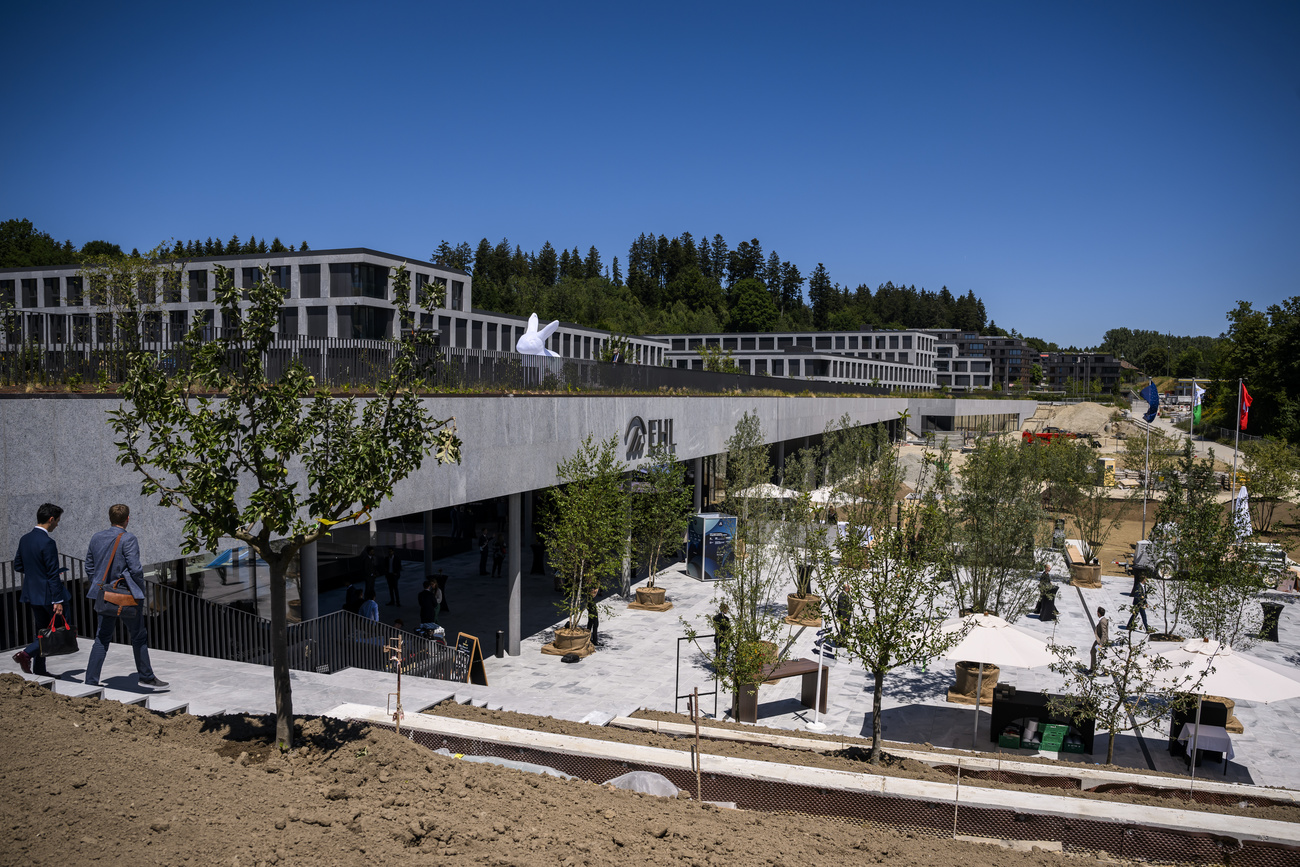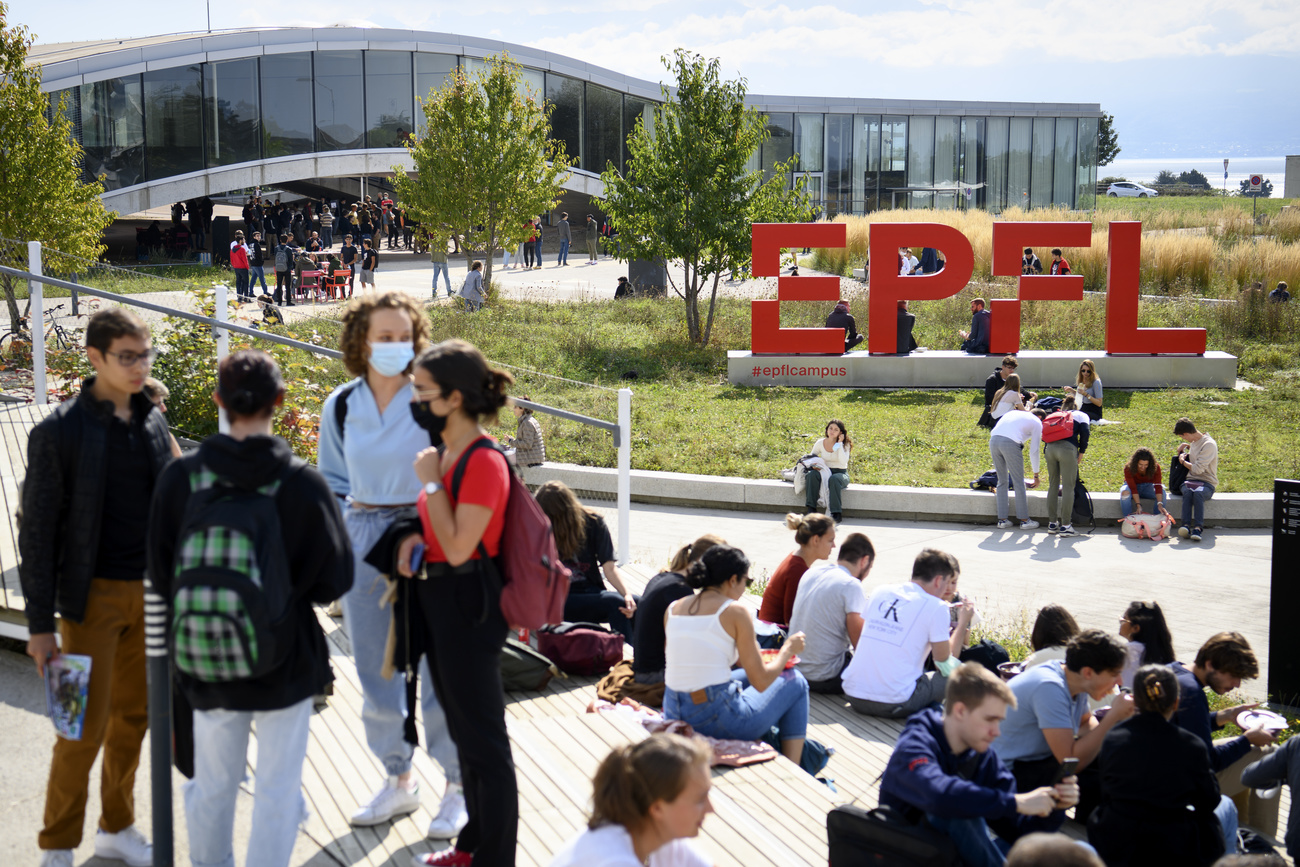Inside the elite Swiss school for hotel managers

As befits a country that runs like clockwork, a university-level institution is coaching students in the exacting standards of high-end hospitality.
In a smart restaurant on the edge of Lausanne, a young woman from Cannes is attempting to open a bottle of Laurent-Perrier Cuvée Rosé. Watching from the middle of the dining room, which has views of the Alps across Lake Geneva, is Eric Iunker, a lecturer whose eyebrows seem to be permanently raised.
At the critical moment, a rush of air escapes from the bottle, not with a pop so much as an urgent “shhhh”, like the airlock on some sci-fi spaceship. “I’m sorry, it’s not supposed to make a noise,” says 19-year-old Chiara Dosne. She blushes a little before pouring my glass.

The student, who wears a red necktie over a shirt that is as carefully ironed as the linen tablecloths, has poured champagne before; she used to work in a bar. “But here the standard is much higher,” she says, gently lowering the bottle back into its ice bucket.
I’m having lunch at Berceau de Sens, which is surely the only Michelin-starred restaurant that guests must reach by traipsing through a student cafeteria. The restaurant is the culinary heart of EHL Hospitality Business School, an elite Swiss university better known by its former title, the École Hôtelière de Lausanne. Its alumni include the general managers of some of the world’s grandest hotels.
Dosne and the other students, who are being put through their paces on both sides of the kitchen pass, are just two weeks into their four-year degrees in international hospitality management. Given that the course fees amount to SFr177,050 (just over $200,000, and not including accommodation), most of them have enjoyed privileged upbringings. But in their first year here, they must do practical work, from pouring wine to poaching eggs — and polishing lavatories to a five-star shine.

“They are not being trained to become room attendants, but they have to understand the importance and principle of cleaning to the highest standards,” says Julien Simon, who ran the rooms division of a big hotel before joining EHL in 2013. “And you have to imagine that some of them have never even touched a Hoover.”
I find Simon armed with a clipboard in a corridor at the on-campus accommodation. A group of freshmen dressed in smart white polo shirts are racing to tidy and clean their classmates’ rooms. “The hardest things are the polishing and the hair in the drains,” says Justine Lutt, 18, from Paris, who met her first mop last week.
As we talk, Simon finds a barely visible fingerprint on a white wardrobe. But he says the space under a bed is the true measure of any hotel’s standards. He recalls staying at a hotel run by a friend who knew of his eagle eye, and thinking “gotcha!” when he found a small piece of paper under his bed. “I pulled it out and, written on it was: ‘Yes, we have cleaned under the bed’.”
Apart from the gaudy plastic housekeeping carts in the corridor, a lot of the lessons at EHL have changed little since Jacques Tschumi, a pioneering Swiss hotelier, started the world’s first hospitality school in a room of Lausanne’s Hôtel Angleterre in 1893. The school, whose first cohort of 27 students slept in a dormitory that looked like a sanatorium, was his response to rising demand for top-quality training at the height of the Victorian Alpine tourism boom.
The first classes included calligraphy, languages, maths and géographie touristique, with on-the-job training in the hotel: linen pressing, vegetable growing, the art of carrying giant trays of silver salvers upstairs. The school moved into its own premises in 1903 and blossomed after the second world war.

More
Hospitality business school expands its campus – and outlook
More than 30,000 students have passed through EHL’s doors, which, since 1975, have swung open at its current site, a former farm high above the lake at Lausanne’s northern edge. There are now more than 4,000 students from 126 countries on three campuses (EHL acquired a smaller Swiss hospitality college in Passugg in 2013, and opened a Singapore outpost in 2021).
The Lausanne campus feels more like Stanford than a starchy hotel school. Much of it is brand new; an almost $300mn expansion that opened in 2022 has more than doubled its size, with airy new buildings and training kitchens that would be the envy of any chef. They surround a listed and restored 18th-century barn that was part of the original farm.
Students stride around in designer clothes, clutching leather briefcases and handbags and vaping in the sun on the terrace above the tennis courts. I’ve never seen so many cashmere turtlenecks worn under suit jackets. A 15-page dress code recently dropped the requirement for ties but is still more exacting than that of many Mayfair clubs.
Markus Venzin is sticking with ties, and sports an immaculate Windsor knot when I find him listening to Aerosmith in a seminar room. But the CEO of the EHL group otherwise epitomises its modernisation. He arrived in 2022, not long after the new campus opened with an expanded name, adding “hospitality business school” to its initials.
Venzin, who previously worked as a business professor and start-up founder in Milan, tells me that today fewer than half of EHL graduates go into hospitality at all: “It’s important that they are equipped with a set of competencies that also allow them to enter neighbouring industries.”
High-end hospitality culture, which was arguably forged in Lausanne, is now transforming multiple industries, Venzin says, and EHL’s teaching staff are frequently called on to consult on projects that have nothing to do with hotels. A luxury jewellery brand, for example, determined that the long queues outside one of its stores were putting off top clients, so it created a bar and lounge with a concierge and an appointments policy. A Chinese chain of private maternity hospitals asked EHL to improve the non-medical care of its wealthy mothers.
Meanwhile private banks are increasingly treating customers like guests (EHL alumni include Laurent Gagnebin, CEO of Rothschild & Co Bank in Zurich, one of whose own children is now studying at the school). “I’m planning to write a book about how we are going from an experience economy to a hospitality economy,” Venzin says. Dozens of companies are part of the “EHL Alliance”, allowing them to hold recruitment drives on campus. They include Four Seasons, Accor and Hyatt, but also AB InBev, the drinks giant and Migros, the supermarket chain. The day after my visit, a senior KFC executive was due on campus for a conference with the promise of a “crispy surprise delivery”.
Max Watts looks and sounds like he’s made to run a grand hotel. Poised and polished, he’s also a tie guy, and wears a navy double-breasted suit. The final-year student comes from Essex, where his father runs a successful truck repairs business. As a kid, he was fascinated by the inner workings of the fancy hotels he stayed in on family holidays.
At EHL, Watts, 21, has done the required internships, including a stint at Inverlochy Castle, a five-star hotel in the Scottish Highlands. He has excelled as a cleaner, a sous-chef and a mixologist (in another classroom, I watch students blind-tasting spirits at 10am. The silver spittoons on their desks only highlight the incongruity of it all). But he now wants to get into real estate finance. “The definition of hospitality is looking after people, and I can’t name a business that doesn’t require that,” he says.
It’s almost a relief to find students who still dream of working in — and perhaps managing — the kind of grand hotels that EHL was born to serve. In one of its gleaming new kitchens, Gervais Milandou-Nlemvo, 22, is experimenting with a twist on maafe, a West African peanut stew, for a contest later in the week. He grew up in Paris, where he has worked in a junior role at a top restaurant. He’s in Lausanne for five months — and about $28,000 — to gain a culinary and restaurant management certificate, one of several short or postgrad courses that EHL also offers. He’ll take it to Congo, where his family is from, and expand their small chain of hotels. “I really want to help my dad with the restaurants,” he says.

More
Are Swiss universities victims of their success?
For Giulia Paloni, also 22, becoming a general manager (GM) is the dream. “I have this energy and passion for hospitality in my blood,” says the final-year degree student from Rome. She also loves to travel, and is seduced by the popular perception of the unflappable GM.
“A lot of people do this job because they watched Pretty Woman,” says Vincent Billiard, who saw the 1990 film as a kid. It features Bernie, the all-seeing yet discreet manager of a Beverly Hills hotel. Billiard dreamt of doing the same job and graduated from EHL in 2002. He now manages the renowned Hôtel de Crillon in Paris for the Rosewood group. He says the job has become more corporate and strategic since the Pretty Woman days, although he still spends long hours glad-handing in the lobby.
Today’s best-known fictional GM is perhaps Armond, the hapless manager of the White Lotus resort in the first series of the hit TV show. Billiard suspects the character’s back-story might not have included time at EHL. “I’ve only seen parts of it, but I think I can say that the manager was making a lot of bad decisions,” he says, laughing.
Back in the Berceau de Sens, the service is smooth, at least to my untrained eye. Katarina Stavridaki, a Greek student, is taking our orders. In her notepad, she numbers diners around the table, clockwise, starting with the person sitting closest to the nearest wall, so that she can remember who orders what. I go for the “perfect egg”, which is boiled at 63C for almost an hour, and the beef cheeks served with a “carrot symphony”.
When the beef arrives at my table, I notice nothing amiss. A moment later, with seconds to spare before I lift my knife and fork, Eric Iunker, the guy with the raised eyebrows, swoops in from a distance, as silently as a barn owl, to move my plate half a centimetre inwards, so that its front edge lines up with the edge of the table. Stavridaki is now watching him, and makes a mental note.
Copyright The Financial Times Limited 2024
Simon Usborne was a guest of the EHL Hospitality Business School.

In compliance with the JTI standards
More: SWI swissinfo.ch certified by the Journalism Trust Initiative








You can find an overview of ongoing debates with our journalists here . Please join us!
If you want to start a conversation about a topic raised in this article or want to report factual errors, email us at english@swissinfo.ch.